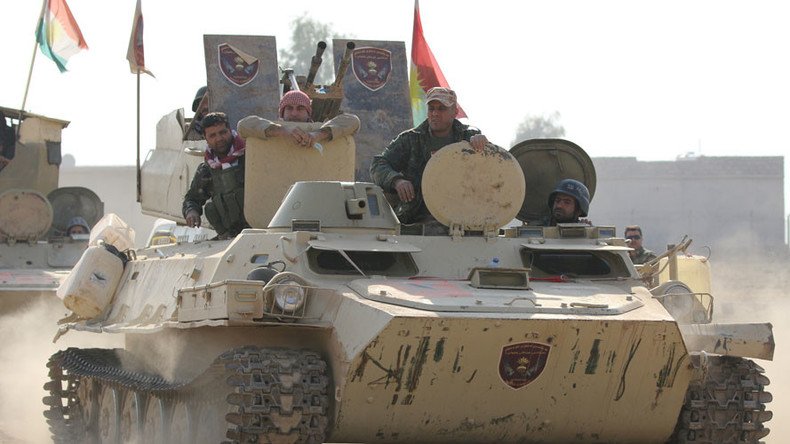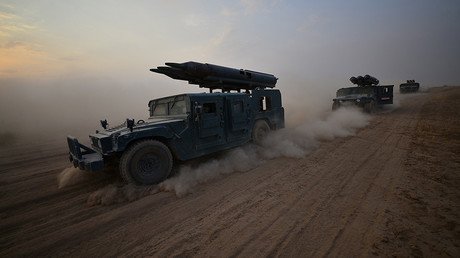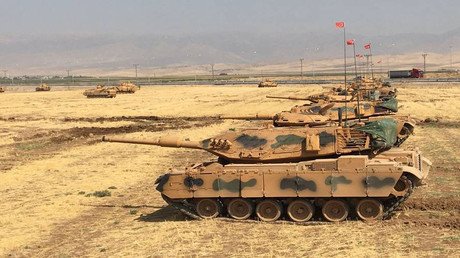As Kirkuk boils, Kurdistan about to hurl Iraq into turmoil over ‘independence’ referendum

Kurdistan’s President Massoud Barzani’s rushed plan for the region will only wreak havoc. A fresh Kirkuk conflict which pits Kurdish forces against Iraqi militias may result in a new Kurdistan which could exclude the president from office just as quickly
‘Ethnic cleansing’ is the term a CIA officer coined when writing a report about the former Yugoslavia. Yet the chilling phrase is about to feature in the annals of modern history in Kurdistan, Iraq. This time from hurried, frantic political jostling from its own leadership and not from the barrel of a gun held by a terrorist.
Once again, minorities are being threatened in Kurdistan’s bid to become independent from greater Iraq. Set for an unprecedented referendum to be held on September 25th, all eyes are on the multi-ethnic city of Kirkuk.
Although President Barzani has been calling for independence from Baghdad for a number of years, few leaders in the region thought he would actually plow ahead with the ruse, which, on the face of it, appears to only spell conflict for both troubled Iraq and even the region.
“Illogical to continue”
It’s easy to see why Barzani has chosen now to move. Now the campaign to rid the region of ISIS is more or less over, and Iraq itself is at peace, he may well believe that regional powers are tired of conflict. Also, there is an argument that Kurdistan’s own army fought harder than Iraqi forces and should be given the spoils of war – the cities taken by ISIS within Kurdistan, which were taken back by the infamous Peshmerga fighters cannot be handed back to Baghdad, Barzani would argue.
To complicate matters, the present boundaries which were drawn up by the British and French – the Sykes-Picot agreement of 1916 which drew the border lines of the entire Middle East - seem more than ever outdated and irrelevant. Barzani believes now is the time for an entirely new arrangement with Baghdad which, since 2014, had begrudgingly agreed to Kurdistan being a semi-autonomous state, controlling its own oil exports is one pivotal example.
But there are other reasons, which are darker and less obvious to Western pundits.
The Kurds historically have been persecuted for decades by Baghdad and see little distinction between Saddam Hussein’s chemical slaughter of them in 1988, which killed 5,000 civilians and the more recent terrorist phenomenon ISIS, which in Iraq was made up of many of Saddam’s henchmen. And the Shia-led Baghdad government is trusted even less, despite giving the Kurds a number of concessions to become ‘semi-autonomous.'
According to The Guardian, Barzani said regional and global powers now needed to enshrine a new pact that would “protect communities in Iraq and Syria, where divisions have become entrenched on socio-religious and sectarian lines.”
“There must be a [new] agreement, it is important to see what type of agreement it is, what mechanism it can bring and rely on to formalize things, and what will be its status. When the formalization of that agreement will be is not known yet. It’s illogical to continue or insist on repeating a wrong experiment that was repeated for 100 years and is leading nowhere.”
“Right now, Iraq is divided” the Kurdish leader argues. “We are not responsible for it. On the contrary, we have done our best to preserve Iraqi unity and a democratic Iraq. In 1991, we went to Iraq and negotiated with those criminals that were responsible with the chemical bombardment, the Anfal campaign [launched by Saddam Hussein against the Kurds]."
Put bluntly, not only is there little faith in Iraq’s new geopolitical alignment toward Iran, but the Kurds want to now break all political and economic ties as they feel more distant than ever from Baghdad – a stunt which has enraged the establishment in the Iraqi capital.
And there is no better example which will exemplify that impasse than Kirkuk, which most regional analysts tell me is really only what the referendum is about.
The oil-rich, multiethnic city is technically part of Kurdistan, but Baghdad argues that because of its cultural mix, should be considered part of ‘Iraq proper.' That goes for oil revenues as well, which is at the heart of the entire matter. Both Barzani and the Iraqi Prime Minister Abadi have issued stern threats in recent days over the city, which, Barazani has stated quite clearly will be taken as part of Kurdistan’s independence – and Abadi has responded with a declaration of “military intervention” for the city itself.
“The Kurds have to realize they are opening the gates to regional intervention,” warned Abadi in an interview.
Baghdad firing the Kirkuk governor has also raised tensions and resulted in more armed forces moving into the city which has Arabs, Christians, Turkmans and – notably – Shia communities, the latter ready to fight a KRG takeover.
The stakes seem so high that one has to wonder whether Barzani has taken leave of his senses. To enter into a war over Kirkuk with Iraqi Shia militias and possibly even draw Iran into the conflict could be considered a sort of suicide pact for himself and an auto-destruct lever which will be plunged for Kurdistan itself.
Is Barzani bluffing?
The line of countries in the region who are opposing it is long. And these countries will be the new neighbors in a new Kurdistan which already those same countries are talking about isolating by closing borders. If Iraq, Turkey, Syria, and Iran closed its borders with Kurdistan, wouldn’t the ‘independence’ ruse be self-defeating? How would essential oil be exported if an Independent Kurdistan is isolated and its borders are closed?
Or is Barzani bluffing and is really looking to cajole the US into brokering a better deal for Erbil with its ‘arrangement’ with Baghdad? And certainly such a new deal would probably give the lion’s share of oil revenues from Kirkuk to Erbil.
Barzani may be bluffing, but he has a lot to bluff with in his hand. Being isolated not only doesn’t work for a post-independence Kurdistan, but it also has grave implications for other countries. To destabilize Iraq is worrying enough but Iran is concerned that its own Kurdish minorities would also aspire to an independence bid, while Turkey – who once supported the move – has since argued that it can only embolden the Kurds in Northern Syria whose PKK contingent would threaten Turkey’s stability. Or is he hoping that a deal with Turkey could be struck to allow the oil exports, while in turn, agreeing to resolve the vexing, ever-present worry of PKK ambitions both in Syria and in Turkey? It’s a long shot as the PKK doesn’t respect Barzani or recognize his authority.
Yet, certainly Ankara has a lot to say and is sending enough messages through its pro-Erdogan broadsheets, which argue that Barzani is “inexperienced” - which explains his haste and that he is threatening to invite an Iranian-backed takeover of his entire country, not only Kirkuk, which might even ultimately unseat him from power.
Turkey has asked Barzani to “cancel” the referendum, not merely postpone it, such is its disdain for the beleaguered plan. But Ankara also sympathizes with the Kurdish leader and seems to be indicating that it is reaching out. Certainly striking a deal with Turkey and perhaps asking President Erdogan to intervene as a broker might be a sage decision post-referendum, as Rex Tillerson doesn’t understand the nuances and can’t offer guarantees to Barzani, although other reports merely point out that the US has enough on its plate with North Korea, Iran and Russia and would prefer the Kurdistan leader postponed the vote until after Iraqi elections in April 2018.
Barzani’s relations with Erdogan is critical, given that Turkey is the only viable oil lifeline. Yet Barzani has not heeded the warnings from Ankara which has provoked the Turks to threaten to block the oil transit.
The question is though whether the regional players, as well as Washington, would even take Erdogan seriously, as recently the Turkish leader was not treated with the reverence that perhaps he believes he deserves.
Indeed, Turkey’s shift toward Russia’s influence may be the very crux of why Washington now wouldn’t take Erdogan’s calls over the Kurds’ imminent need to take what they feel is rightfully theirs – a misunderstood ethnic group which even say “the only friends the Kurds have are the hills.”
Martin Jay is based in Beirut and can be followed on @MartinRJay
The statements, views and opinions expressed in this column are solely those of the author and do not necessarily represent those of RT.















